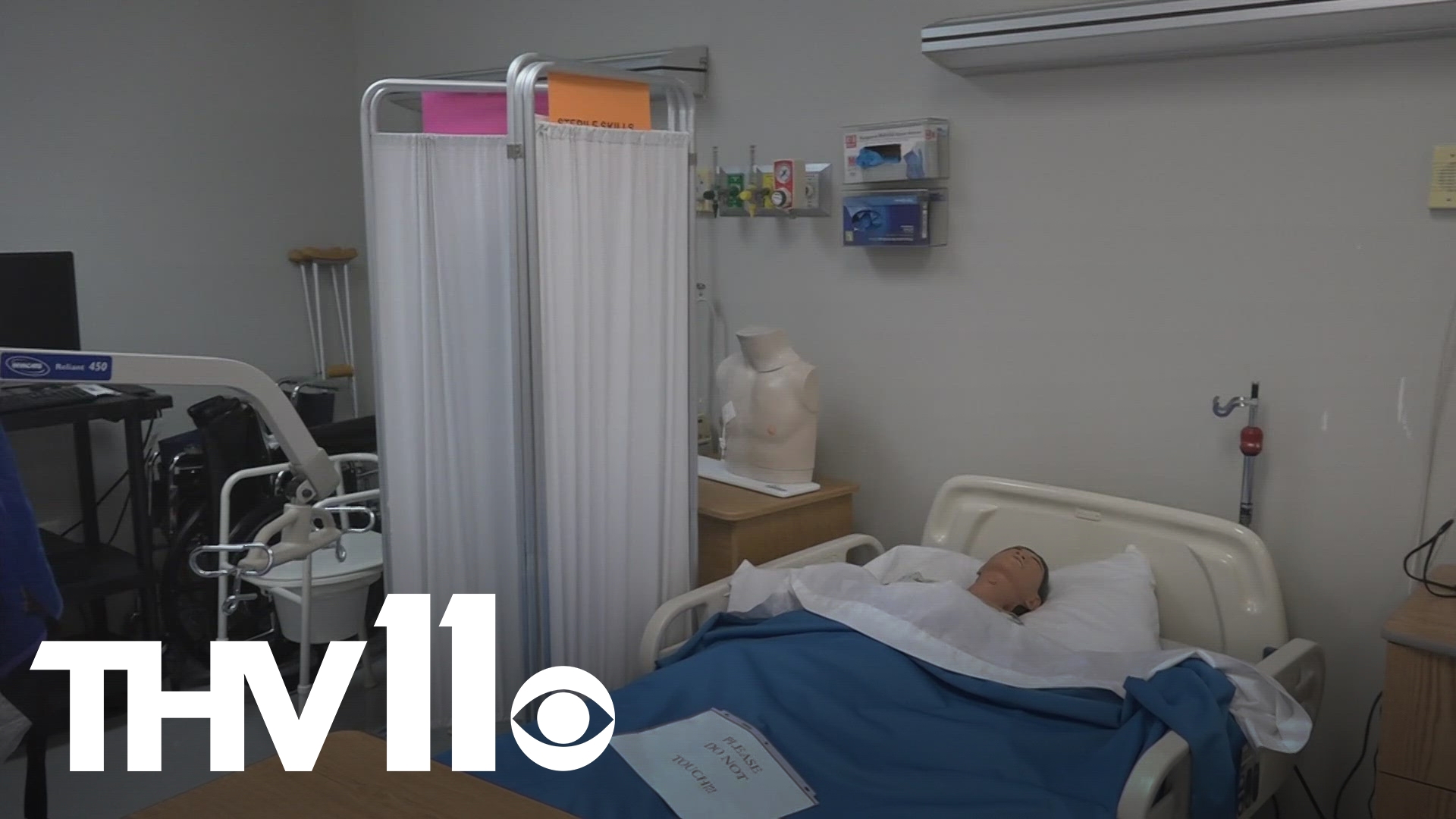NORTH LITTLE ROCK, Ark. — The COVID-19 pandemic strained the healthcare industry, and few people have been willing to pursue nursing careers.
Now, Pulaski Tech and Arkansas-Pine Bluff hope to fill that healthcare pipeline again with revamped learning spaces thanks to grants and federal funding.
"It helps our students," UAPTC Chancellor Dr. Summer DeProw said. "It gives them opportunities and gives us funding to give the students opportunities. More importantly, more nurses help Arkansans with their healthcare."
Pulaski Tech received nearly $6 million from the U.S. Department of Labor and about $93,000 from the Windgate Foundation to expand its nursing program.
DeProw said the funding will allow them to add classrooms and labs to the Little Rock location off Interstate 30 and upgrade the existing nursing classrooms at the main campus in North Little Rock.
"The Department of Labor grant is going to give us funding for additional faculty and student success coaches, and we're planning to hire nurses to coach and tutor students in the nursing program," DeProw said. "The Wingate Foundation grant is solely going to be for equipment."
At UAPB, the school is preparing to build its first stand-alone nursing building through a $15 million investment from a federal legislative package.
"It's an investment to this university... an investment to the nursing program," said Dr. Brenda Jacobs with the UAPB Nursing Department. "It's also on the bigger picture and investment to the community of Southeast Arkansas."
Jacobs hopes having more space and accepting more students will improve the ongoing nurse shortage.
"We can only accept enough students for what we have room for," Jacobs said. "Having expanded spaces, expanded computer labs [and] simulation labs will help us so much. It'll help advance the program."
The Arkansas Nurses Association has weighed in on the shortage and issued the following statement:
"The Arkansas Nurses Association supports institutions of higher learning working to improve and expand enrollment capacity, which is necessary to address the nursing workforce shortage in Arkansas and better serve the individuals and institutions throughout our state. However, the nursing workforce shortage is multifaceted. While nursing pay is higher than before the pandemic, pay for nursing instructors has yet to keep pace. The U.S. Bureau of Labor Statistics reports an annual median salary of $61,530. Arkansas is ranked 47th compared to the national average of $82,750 annually. This disparity puts Arkansas at a disadvantage when competing for graduating nurses. Equally important, the last workforce report by the Arkansas Center for Nursing found the comparison of nurses who work in the clinical setting have a higher average salary than nursing faculty. Nurse faculty are already required to maintain more clinical and scholarly expertise relating to training, continuing education, service, and curriculum development. Expanding programs without addressing faculty compensation and needs presents a major roadblock to attracting and training new educators and, in turn, preparing more nurses to practice despite the ability to improve facilities and increase enrollment.
Retention of currently working nurses and recovery of continued Licensed Nurses who have chosen not to practice or practice outside the state. Environments in which nurses are working must be addressed. The burden of working long shifts with the expectation to increase the number of duties assigned to meet the demands of the patient population presenting to healthcare facilities is growing nurses' anxiety and fear of making errors. Errors place patients, organizations, and healthcare workers at risk. The sustained impact of working understaffed is causing many workers to evaluate where, when, and if they will continue working in the profession. Nurses are increasingly taking travel and contract positions, which are more flexible to personal schedules and usually better compensated, allowing them to address individual issues such as the high cost of childcare and improved work-life balance.
Nurses need an environment that is safe for both patients and staff. This is not just a desire but a necessity for effective healthcare delivery. Most nurses want a consistent and stable workplace. To achieve this, the direct patient care staff needs a consistent voice in the staffing discussion and routine transparency in healthcare facility staffing of nurses to consumers. Although compensation and environment in Arkansas varies by region and facility, In general, nurses want flexible schedules, a safe working environment, improved compensation, workforce development, and opportunities to advance within organizations they are already working in."
Jacobs said the timeline for the new UAPB nursing school is likely to be announced in the next year or so.

